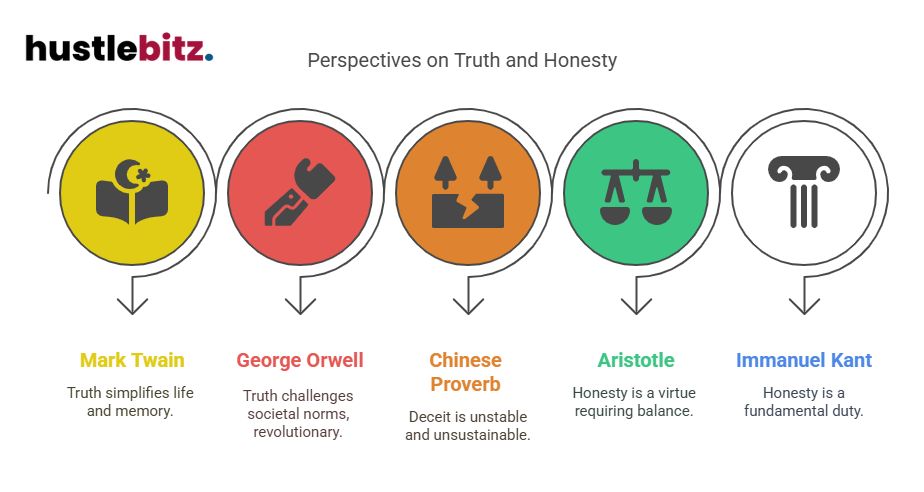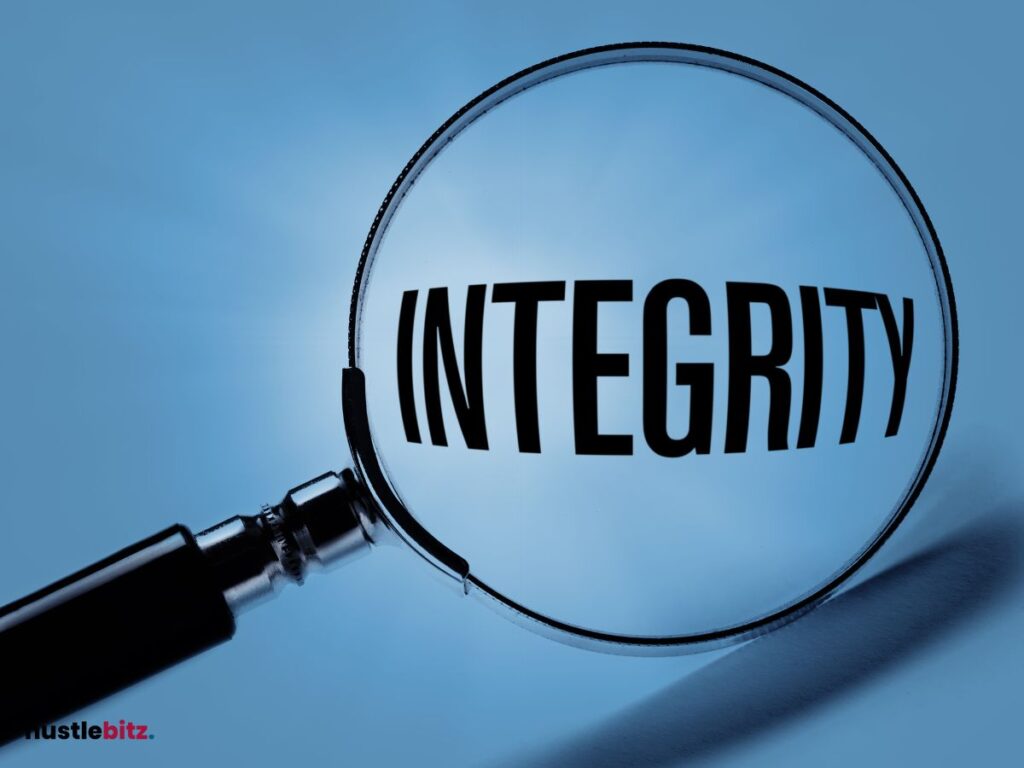Quotes about liars provide profound insights that challenge deception and underscore the enduring power of truth. For instance, the Chinese saying “A lie has no legs” and Mark Twain’s assertion that “If you tell the truth, you don’t have to remember anything” both emphasize the inherent instability of falsehoods. Esteemed thinkers like Fyodor Dostoevsky point out that “Lying to ourselves is more deeply ingrained than lying to others,” highlighting the complexity of self-deception. Religious texts and philosophical teachings also reinforce honesty as a fundamental moral principle. By understanding these perspectives, one gains a deeper appreciation of truth’s critical role in maintaining societal trust and personal integrity.
Key Takeaways
- Mark Twain: “If you tell the truth, you don’t have to remember anything” – Truth simplifies life.
- George Orwell: “In a time of deceit, telling the truth is a revolutionary act” – Truth challenges societal norms.
- Chinese Proverb: “A lie has no legs” – Deceit is unstable and unsustainable.
- Aristotle: Honesty is a virtue contributing to eudaimonia; requires balance with tact.
- Immanuel Kant: Honesty is a fundamental duty; lying undermines societal trust.

Timeless Proverbs on Lying
Throughout history, cultures around the world have recognized the destructive power of deceit and have encapsulated this wisdom in enduring proverbs. These proverbs offer rich insights into the cultural perspectives on lying, highlighting its moral implications, psychological effects, historical examples, and even legal consequences.
One prominent proverb from the Chinese tradition states, “A lie has no legs.” This adage underscores the belief that deceit is inherently unstable and unsustainable. The moral implication is clear: truth stands firm while lies crumble, reflecting a universal disdain for dishonesty.
From African culture, the Swahili proverb “Lies have short legs” conveys a similar sentiment. It implies that lies are easily caught and cannot travel far. This reflects the psychological effects of lying, where the liar is constantly burdened by the fear of exposure, leading to increased anxiety and stress.
The Spanish proverb “A liar is sooner caught than a cripple” serves as a historical example, demonstrating how societies have long viewed deceit with contempt. It not only underscores the inevitability of truth prevailing but also highlights the societal and legal consequences of lying, where dishonesty can lead to legal repercussions and loss of credibility.
In the English-speaking world, the adage “Honesty is the best policy” encapsulates a pragmatic approach to integrity. The moral implication here is that truthfulness is not just virtuous but also beneficial in the long run, promoting trust and stability.
Lastly, the Indian proverb “Truth will come to light; murder cannot be hid long” serves as a stark reminder of the eventual revelation of deceit. This timeless wisdom emphasizes the psychological burden and inevitable consequences of lying, reinforcing the universal value of truth.
Famous Authors on Deceit

Delving into the works of renowned authors, one finds a wealth of insights into the nature and consequences of deceit. These literary giants have explored the complexities of deceitful behavior, illustrating how truth vs. lies can shape human interaction and moral judgment.
Here are five profound quotes from famous authors that challenge deception:
- Mark Twain:
“If you tell the truth, you don’t have to remember anything.”
Twain poignantly underscores the simplicity and ease of truthfulness. By contrasting the straightforwardness of honesty with the convoluted effort required to sustain lies, he highlights how deceitful behavior can lead to unnecessary complications and the erosion of trust. Personal integrity stands as a bedrock principle, simplifying life and fostering genuine relationships. - Fyodor Dostoevsky:
“Lying to ourselves is more deeply ingrained than lying to others.”
Dostoevsky delves into the psychological aspect of deceit, revealing how self-deception can be more insidious than deceiving others. This introspective quote sheds light on the perilous impact of dishonesty, suggesting that it distorts our self-perception and moral compass, ultimately undermining personal integrity. - George Orwell:
“In a time of deceit, telling the truth is a revolutionary act.”
Orwell’s assertion speaks to the courage required to uphold truth in a milieu dominated by lies. It emphasizes the profound impact of dishonesty on societal norms and the potential for truth to disrupt entrenched deceitful behavior. His words inspire a commitment to transparency and the valorization of honesty, even in the face of widespread deception.
These quotes from literary luminaries offer a powerful commentary on deceit, underscoring its detrimental effects on individuals and society.
They remind us of the importance of personal integrity and the enduring value of trust.
Philosophers’ Views on Honesty

Honesty, a cornerstone of ethical philosophy, has been a subject of profound contemplation by some of history’s greatest thinkers. Their philosophical perspectives offer invaluable insights into the ethical implications of truth versus deception, and they delve deeply into the interplay between human psychology and societal impacts.
Immanuel Kant, a pivotal figure in modern philosophy, posited that honesty is a fundamental duty. In his categorical imperative, Kant emphasized that lying is intrinsically wrong, as it undermines the very foundation of trust essential for any functional society. His deontological approach underscores the ethical necessity of truth-telling.
Aristotle, in contrast, explored honesty through the lens of virtue ethics. He asserted that honesty is a virtue that contributes to eudaimonia, or human flourishing. In “Nicomachean Ethics,” Aristotle argued that a virtuous person must balance honesty with tact, reflecting a nuanced understanding of truth versus deception and their effects on human relationships.
Søren Kierkegaard, a Danish existentialist, examined honesty in the context of individual authenticity. He asserted that being truthful to oneself and others is crucial for genuine existence. Kierkegaard’s insights highlight the psychological dimensions of honesty and its role in personal integrity and societal cohesion.
John Stuart Mill, a proponent of utilitarianism, approached honesty from a consequentialist perspective. Mill argued that honesty generally leads to the greatest happiness for the greatest number, thereby framing the ethical implications of honesty in terms of its societal impacts.
Friedrich Nietzsche, however, offered a more complex view. He questioned the conventional value of honesty, suggesting that some forms of deception might be necessary for human development. Nietzsche’s provocative stance invites ongoing debate about the nuanced relationship between truth and human psychology.
Religious Texts on Integrity

The philosophical perspectives on honesty serve as a compelling foundation for examining how integrity is portrayed in religious texts. Across various faith traditions, scriptural honesty and spiritual integrity are paramount, underscoring the importance of faithful living and moral principles.
Here are five notable religious texts that emphasize integrity:
- The Bible (Christianity)
- Proverbs 12:22: “The Lord detests lying lips, but he delights in people who are trustworthy.”
- This verse highlights the ethical teachings central to Christianity, where truthfulness is not only a moral duty but also a source of divine approval. Faithful living is encouraged by valuing honesty above deceit.
- The Quran (Islam)
- Surah Al-Isra 17:36: “And do not pursue that of which you have no knowledge. Indeed, the hearing, the sight and the heart – about all those [one] will be questioned.”
- This passage advocates for scriptural honesty and the pursuit of truth, emphasizing that every individual is accountable for their actions and intentions. Ethical teachings in Islam prioritize integrity as essential to moral principles.
- The Bhagavad Gita (Hinduism)
- Chapter 16, Verse 3: “Vigor, forgiveness, fortitude, cleanliness, absence of malice, absence of haughtiness – these, O Bharata, are the endowments of one born destined for a divine state.”
- The Bhagavad Gita outlines spiritual integrity as a cornerstone of righteous living. The text encourages adherents to embody virtues that align with ethical teachings, promoting honesty and integrity as pathways to a divine life.
These religious texts collectively stress the significance of integrity in guiding faithful living. By adhering to these moral principles, individuals can navigate their spiritual journeys with clarity and righteousness, reinforcing the universal value of honesty.
Modern Thinkers on Deception

Modern thinkers have significantly contributed to the discourse on deception, offering diverse perspectives that illuminate the complexities and implications of dishonest behavior. These contemporary insights shed light on the psychological, moral, and social dimensions of deception, addressing issues such as trust erosion and communication breakdown.
Top 5 Modern Thinkers on Deception
| Thinker | Key Ideas | Contribution |
| Dan Ariely | Behavioral Economics | Examines self-deception and rationalization. |
| Sam Harris | Neuroscience and Ethics | Discusses the moral implications of lying. |
| Robert Feldman | Psychology of Deception | Analyzes everyday lies and social consequences. |
| Paul Ekman | Nonverbal Communication | Studies facial expressions and deception. |
| Bella DePaulo | Social Psychology | Investigates the impact of lies on relationships. |
Dan Ariely, a prominent behavioral economist, delves into deception psychology by exploring how individuals rationalize dishonest actions. His work highlights the internal conflicts people face when lying and how self-deception can perpetuate unethical behavior.
Sam Harris, through his work in neuroscience and ethics, addresses the moral implications of lying. He posits that even small lies can lead to significant trust erosion, ultimately undermining the fabric of social interactions.
Robert Feldman’s research in the psychology of deception reveals that everyday lies, though often perceived as harmless, have profound social consequences. His findings underscore how these deceptions can lead to a broader communication breakdown.
Paul Ekman’s contributions in nonverbal communication focus on understanding how facial expressions can betray deceptive behavior. His research offers tools to identify deception, thus fostering more honest interactions.
Lastly, Bella DePaulo’s work in social psychology examines how lies impact personal relationships. She emphasizes the long-term effects of deception on trust and the overall health of social bonds.
These modern thinkers provide valuable insights that deepen our understanding of deception, highlighting its far-reaching effects on both individual and societal levels.
Social Media and Dishonesty
Digital platforms have revolutionized communication, yet they have also become breeding grounds for dishonesty. The prevalence of misinformation and deceptive practices on social media has fostered significant trust issues among users. The following examples illustrate the various ways in which social media can contribute to an authenticity crisis.
- False Narratives: Social media is often used to spread false narratives, which can distort public perception and manipulate opinions. One prominent example is the dissemination of fake news, which can influence electoral outcomes and public policy. The rapid sharing of unverified information makes it challenging to discern truth from deception.
- Curated Online Personas: Many users craft idealized versions of themselves on social media, leading to widespread authenticity issues. These carefully curated online personas often project unrealistic lifestyles and achievements, creating a distorted reality.
This phenomenon can lead to feelings of inadequacy and depression among viewers who compare their real lives to these fabricated images.
- Influencer Dishonesty: Influencers wield considerable power in shaping public opinion and consumer behavior. However, instances of dishonesty, such as undisclosed paid promotions or exaggerated product endorsements, have eroded trust.
The influence of dishonest endorsements can mislead consumers and impact purchasing decisions, further complicating the trust landscape.
Final Thoughts
In a world where deception often seems to pervade both personal interactions and societal systems, these quotes and reflections remind us of the enduring value of truth. From ancient proverbs to modern thinkers, the message is clear: honesty fosters trust, builds integrity, and simplifies life. While lies may offer short-term gains, their instability eventually leads to their unraveling. By embracing truth, we contribute to a more authentic and transparent world, one where trust can flourish, and relationships—both personal and societal—are strengthened.




